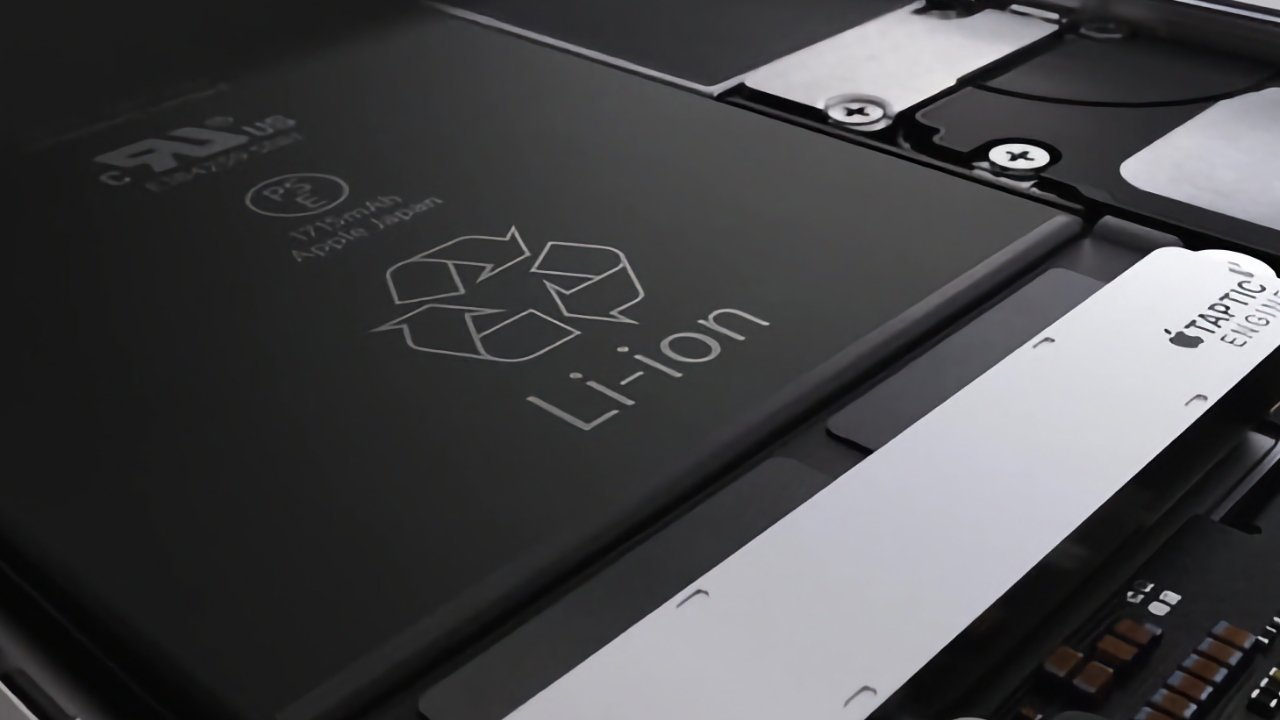Apple asks UK tribunal to throw out 'baseless' iPhone batterygate lawsuit
Apple is attempting to put a stop to a $2 billion lawsuit that continues the so-called "Batterygate" controversy over the throttling of iPhones.

An iPhone battery
In June, a lawsuit was leveled against Apple by a consumer rights activist in the UK, accusing Apple of failing to tell iPhone owners their devices would be "throttled." On Tuesday, Apple attempted to get the suit thrown out.
The lawsuit was originally by Justin Gutmann, demanding Apple pay over 750 million pounds ($900 million at the time) to approximately 25 million iPhone owners in the country. Gutmann's filed complaint, which effectively attempts a class-action lawsuit, accused Apple of using throttling to disguise how the batteries were inadequate.
The so-called "Batterygate" impacted models from the iPhone 6 to the iPhone X.
On Tuesday, Reuters reports the lawsuit has grown to 1.6 billion pounds ($2 billion), as Apple fought the complaint at a London tribunal.
Gutmann's lawyer filings said Apple hid battery issues and "surreptitiously" installed a power management tool that throttled the iPhones. In asking London's Competition Appeal Tribunal to certify the case for it to proceed, the lawyers cited a 2020 settlement for a similar class-action lawsuit in showing Apple demonstrably admitting it happened.
Lawyer Philip Moser also insisted Apple had committed to be "clearer and more upfront" with users about battery health in discussions with the UK's competition regulator in 2019.
In its written arguments, Apple says the lawsuit is "baseless" and denied the batteries were defective, with the exception of some iPhone 6s models that it replaced for free. It also insists it didn't mislead customers about battery problems, and that it offered a public apology in 2017 complete with an offer of cheap battery replacements.
Speaking for Apple, lawyer David Wolfson said the lawsuit argues that "not all batteries could deliver the peak power demanded in all circumstances at all times," something that impacts just about every piece of electronics that contains a lithium-ion battery, especially as the battery ages.
Read on AppleInsider

An iPhone battery
In June, a lawsuit was leveled against Apple by a consumer rights activist in the UK, accusing Apple of failing to tell iPhone owners their devices would be "throttled." On Tuesday, Apple attempted to get the suit thrown out.
The lawsuit was originally by Justin Gutmann, demanding Apple pay over 750 million pounds ($900 million at the time) to approximately 25 million iPhone owners in the country. Gutmann's filed complaint, which effectively attempts a class-action lawsuit, accused Apple of using throttling to disguise how the batteries were inadequate.
The so-called "Batterygate" impacted models from the iPhone 6 to the iPhone X.
On Tuesday, Reuters reports the lawsuit has grown to 1.6 billion pounds ($2 billion), as Apple fought the complaint at a London tribunal.
Gutmann's lawyer filings said Apple hid battery issues and "surreptitiously" installed a power management tool that throttled the iPhones. In asking London's Competition Appeal Tribunal to certify the case for it to proceed, the lawyers cited a 2020 settlement for a similar class-action lawsuit in showing Apple demonstrably admitting it happened.
Lawyer Philip Moser also insisted Apple had committed to be "clearer and more upfront" with users about battery health in discussions with the UK's competition regulator in 2019.
In its written arguments, Apple says the lawsuit is "baseless" and denied the batteries were defective, with the exception of some iPhone 6s models that it replaced for free. It also insists it didn't mislead customers about battery problems, and that it offered a public apology in 2017 complete with an offer of cheap battery replacements.
Speaking for Apple, lawyer David Wolfson said the lawsuit argues that "not all batteries could deliver the peak power demanded in all circumstances at all times," something that impacts just about every piece of electronics that contains a lithium-ion battery, especially as the battery ages.
Read on AppleInsider

Comments
I wonder if Justin Gutmann uses an Apple iPhone, or an Android phone now?
Apple’s motivation for the “throttling” was to extend the life of its phones and to prevent sudden crashes.
This issue is like a monster that is unable to be killed at the end of a horror movie.